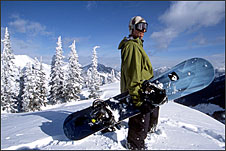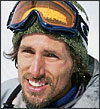
 |
  |
 |
 |
| |
|
|
Kelly
lived life 'strapped in'
By KRISTIN
DIZON AND LEWIS KAMB
SEATTLE POST-INTELLIGENCER
REPORTERS
Jan. 22 - MOUNT
VERNON -- Legend. Pioneer.
Icon. |
|
Those are the
words used to describe Craig Kelly, a world-class snowboarder
from Mount Vernon who died in an avalanche Monday in British
Columbia.
| |
 |
| |
In recent years,
Kelly had turned away from the glare of fame. He loved
escaping the confines of resorts to ride in the pristine
backcountry. BURTON
SNOWBOARDS |
Kelly,
a four-time world snowboarding champion, was one of seven
people killed in the backcountry near the Durrand Glacier when
an avalanche buried them in snow up to 15 feet
deep.
The bodies of the three
Canadians and four Americans were recovered, and Royal
Canadian Mounted Police are continuing their investigation of
the accident.
"It was like
swimming down the roughest river I've ever been in and trying
to keep my head above water," said survivor John Seibert of
Wasilla, Alaska, who was caught in the avalanche that
thundered 300 feet down the
mountainside.
The seven
people killed were part of a group of skiers and snowboarders
who flew in by helicopter to a mountain chalet with access to
untouched, wild glaciers and slopes. Their weeklong trip
started on Saturday. Fourteen survived the
avalanche.
Kelly, 36, was a
snowboarder before most people knew what snowboarding was.
Known for his fluid style and precision, Kelly was one of the
first professionals in the sport. An intelligent, articulate
man, he was also a sort of unofficial ambassador who helped
bring snowboarding to what had been exclusively ski
slopes.
About 10 years ago,
Kelly left the world of competitions and media buzz to pursue
his passion for thick powder, steep slopes and the company of
nature on his own terms.
He
could blaze a trail down a mountain and leave a trail like a
silk ribbon.
"Craig could
pick a beautiful line down a mountain that just fit all of the
nooks and crannies," said his business partner and friend Jeff
Pensiero of Nelson, B.C. "He'd be going a zillion miles an
hour down the mountain and just make it look like
ballet."
Pensiero said Kelly
had been asked to help with the trip to Durrand Glacier and
jumped at the opportunity to learn from the tour operators,
Selkirk Mountain Experience
Skiing.
Kelly spent much of
the past few years splitting his time between Mount Vernon and
Nelson, where he helped run a Cat-skiing operation and was
studying to become a fully certified guide through the
Association of Canadian Mountain
Guides.
There he also met his
girlfriend, Savina Findley, a student of Chinese medicine, and
became a father with the birth of Olivia, nearly
2.
Kelly had traveled to
Revelstoke, in southeastern British Columbia's Selkirk
Mountains, to help guide a group of 21 skiers and snowboarders
when he was killed. He used a "split" snowboard, which splits
in half to help with climbing up hills, then fits together to
board down a slope.
| |
 |
| |
Kelly |
News
of Kelly's death traveled fast in the snowboarding
world.
"The whole industry is
in shell shock at this point," said Cody Dresser, associate
editor of Transworld Snowboarding magazine. "We're at a total
loss."
In addition to Kelly,
the dead included Ralph Lunsford, 49, of Littleton, Colo.;
Dennis Yates, 50, of Los Angeles; and Kathleen Kessler, 39, of
Truckee, Calif. Three were from Canada: Naomi Heffler, 25, of
Calgary; Dave Finnery, 30, of New Westminster, B.C.; and a
50-year-old man from Canmore, Alberta, whose name was not
released pending notification of
relatives.
Yesterday, stunned
friends in the Skagit Valley town where Kelly grew up said
that the man died the same way he lived -- "strapped
in."
"From the very beginning
to the end, Craig was awesome. A genius," said longtime friend
Dan Donnelly, a former professional rider who toured the world
with Kelly.
Already a
national-level BMX rider, Kelly took up snowboarding in 1981,
when the sport was barely known and considered a scourge by
many skiers. After a friend introduced him to the "snurfer,"
Kelly and friends headed for Mount Baker, where skiers gawked
at them as they took turns on the rudimentary
board.
He and a circle of
friends became the Mount Baker Hard Core, a posse of
snowboarders who went to the mountain every
weekend.
"He was one of the
first to bring a snowboard up to Mount Baker and showed it to
Duncan Howat, our general manager," said Gwyn Howat,
spokeswoman at Mount Baker Ski
area.
"We're one of the first
to allow snowboarding in North America, so he's very much a
forerunner in the sport. He was one of the first, if not the
first, to really make it successfully as a snowboard
athlete."
Now, about 70
percent of season pass holders at Mount Baker are
snowboarders.
"He was one up
on most of his friends because we were just partying and
having fun," said Carter Turk, one of Kelly's longtime friends
and early riding companions. "But he was more focused. He
envisioned snowboarding as a bigger thing, and it paid off for
him."
After graduating from
Mount Vernon High School in 1983, Kelly went to the University
of Washington, where he was an honor student. Just shy of
earning his degree, Kelly left to become a pro
snowboarder.
He was sponsored
by industry leader Burton Snowboards, which gave him his own
signature board, and became close to the company's founder,
Jake Burton.
In a statement,
Burton said, "I can't think of a bigger loss to the sport and
to all of us
personally."
Friends say that
Kelly's finesse propelled him to the top and his regimented
training helped him master everything in snowboarding from
giant slalom to throwing tricks in the pipeline in
freestyle.
Quiet, focused and
intense, Kelly visualized his future, then methodically set
goals to make it happen.
"His
theory was if you could jump off something and keep your mind
quiet, you could land it," said Kirsti McGuire, another
longtime friend. "He was into this kind of Zen
thing."
Kelly toured the
world, even snowboarding in Iran. He starred in big-air films,
including some of the Warren Miller series, and, more
recently, the 1999 IMAX movie, "Extreme." He also ran a
snowboarding school in the early 1990s with his then-wife,
Kelly Jo Kelly.
He built a
home in Glacier, at the foot of Mount Baker, and tried new
things such as surfing. He'd ride waves on the coast of
Washington even in the coldest winter days, and one friend
said he spent three years surfing in
Chile.
But Kelly turned away
from his successful career as a pro snowboarder for his pure
love of the mountains.
"After
he did all that, he found the backcountry and cared about the
soul of snowboarding more than the actual fame," said Dresser,
the magazine editor.
Jeff
Galbraith, editor and publisher of Bellingham-based
"Frequency: the snowboarder's journal," credits Kelly with
advancing the sport more than any other person except Jake
Burton.
"He was just
flawless," said Galbraith, who used to snowboard with Kelly in
the early days on Mount Baker. "He'd take things that others
would struggle to get down and turn them into
artistry."
Once Kelly was
ready to leave the competitive world, Galbraith said he
"turned a little more introspective and pulled back from the
media."
Nearly three years
ago, Kelly wrote about his feelings for backcountry boarding
in Transworld Snowboarding
magazine.
"What you do once
you're beyond the confines of your local lift service can be
as limitless as the mountains themselves," he wrote. "While I
will always have the utmost respect for the superhuman
out-of-bounds freestyle and extreme stunts that seem to
continually progress beyond our imaginable limits, my highest
appreciation goes out to the simple rider who's out there just
for the experience."
Though
he continued developing and testing products for Burton
Snowboards, he began spending more time in British Columbia
and working toward his backcountry guide certification. Kelly
had already passed the highest level of certification with the
Canadian Avalanche Association and he had passed the first two
parts of the test for the Association of Canadian Mountain
Guides.
The third and final
part of the test was coming soon, said Pensiero, the partner
who owns Baldface Lodge.
"He
was not in a position to be taking any risks," said Pensiero.
"He was in love with his girlfriend and daughter and he was
going places."
Kelly knew the
dangers of mountain terrain well. On each venture into the
backcountry, he took a backpack with a shovel and transceiver
in case of avalanche, friends
said.
Kelly's friends now
take solace in knowing that he lived out his
dreams.
"He was someone you
kind of envied and looked up to because he played all of his
cards right and worked hard," said Turk. ". . . The guy lived
the life of like 30 people all in
one."
P-I reporter Kristin
Dizon can be reached at 206-448-8118 or
kristindizon@seattlepi.com P-I reporter John Iwasaki and The
Associated Press contributed to this
report. |
| |
|


